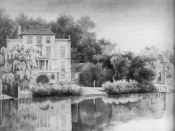Misogyny, hostility towards women, is a prominent theme that goes through the period of Renaissance in British literature. Unveiling the thread of misogyny entails a closer look at satire, the literary form through which hatred was expressed. In this case, we should first establish a distinction between the two faces of satire: the first being satire as a severe exposure of what in public or private morals deserves rebuke, and satire as a weapon of misogyny, which is the writer's own personal bias accompanied by societal biases.
We can see in the writings of John Donne and Alexander Pope an application of satire to depict the dark side of a woman's nature. This essay will demonstrate that these writers were not using satire just as a weapon against women's negative qualities, but mostly as a tool to degrade the nature of women in general. The essay will present the support for the idea that these writers were highly misogynistic.
Their misogyny is predominantly rooted in the societal discrimination of women in the eighteenth century. Furthermore, according to Christian attitudes towards women, the latter represent a combination of Virgin Mary's purity and righteousness as well as the wickedness and sinfulness of Eve. Societal stereotypes together with religious ideology, mythological origin, and individual prejudice created the environment for the authors to produce works that would breathe with aggression and biased attitude towards women.
Renaissance playwrights and audiences enjoyed misogynistic diatribes and Renaissance sonnet sequences regularly included hostile poems; but the period was, mainly characterized by exaltation of both women and romantic love. Donne's savage attacks on women are greatly outnumbered by poems of passionate praise. However, this does not prove that Donne was not misogynistic. John Donne, the most passionate of the Renaissance love poets, was also the most intensely ambivalent...


